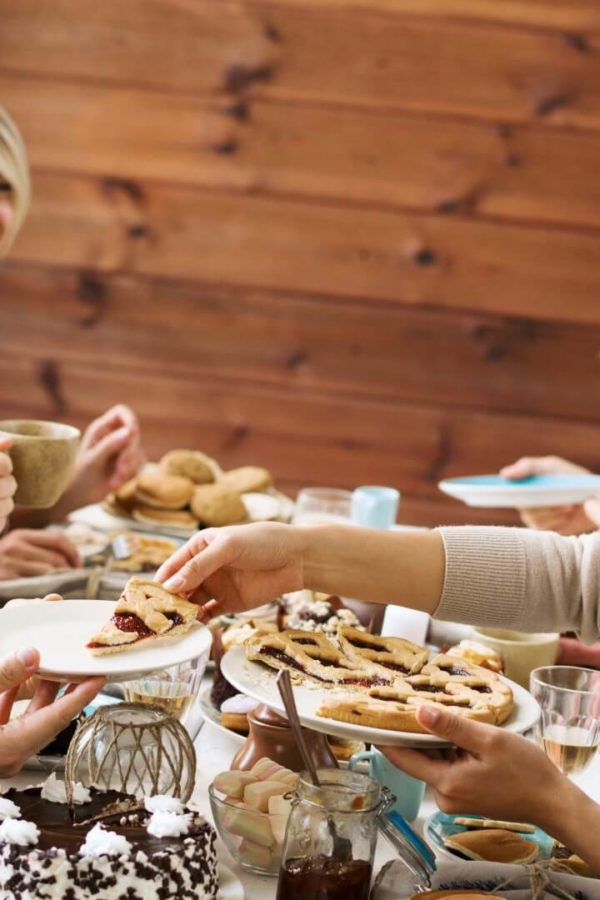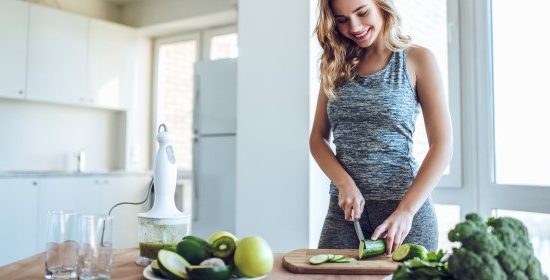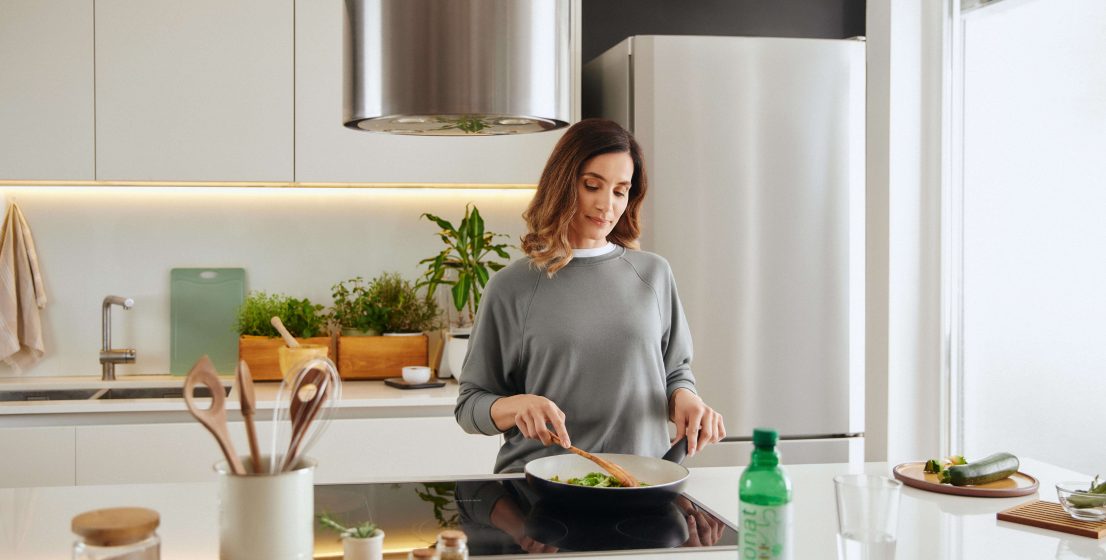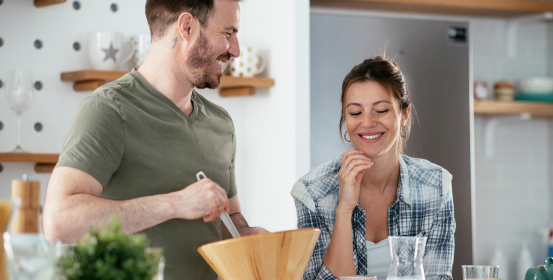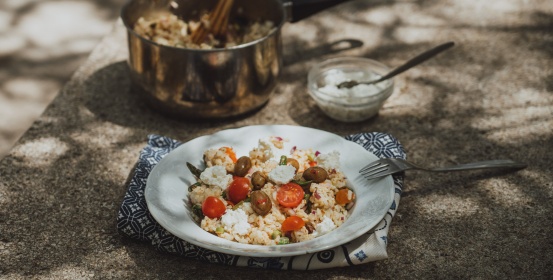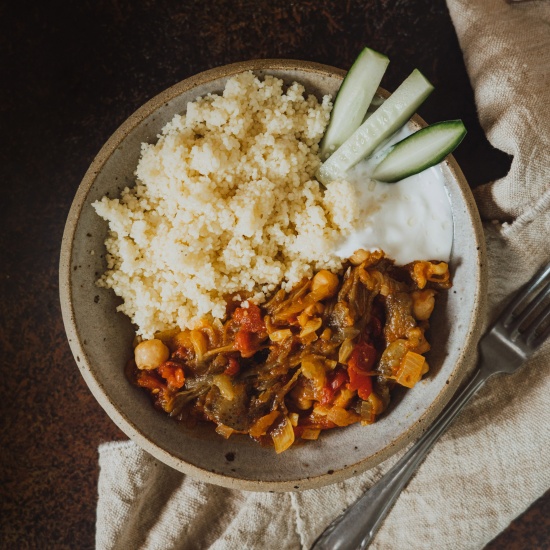Good food is always hard to resist. It gets even more difficult around Christmas and New Year’s holidays when numerous get-togethers and celebrations are full of your favorite delicacies. Then, after returning to our routine in January, it is difficult to avoid feeling bad and guilty about gaining weight. And if you are wondering if it is in any way possible to stand up to this trend, we have great news for you: of course, it is! So, even if it is almost impossible not to treat ourselves with an extra treat during the holidays (and so be it!), there are still ways that even the biggest gourmets can use to reduce their calorie intake, and not just during the holidays, but every day!
Overeating for a few days takes its toll
If we sit at a table stuffed with good food, there is a big chance that we will eat more than usual. During the holidays this can happen not just a few times a week, but even a few times a day. The food we eat during the holidays is usually more calorific than the food we normally eat: it has more fats, salt, sugar… Over-consumption of such food and drinks puts a big stress on the liver and digestive system, which in many people causes bloating, constipation, and malaise. Feeling full is often followed by slowed digestion, which can quickly spoil the mood.
So, how do we eat smarter and avoid such problems? And what to do if we still get carried away and overdo it?
How to prevent overeating?
Food brings people together, lifts the mood, brings back memories, and it can have many other positive effects, but only if we stick to the right measure when eating. And since this is easier said than done, in this article we have decided to bring you the most useful advice which will help resist the extra serving at lunch, a quick midnight snack, or “unhealthy dinner”.
Eat more of the things you can eat less
Include in your menu as many foodstuffs rich in fiber and poor in calories as possible. Some are grapefruit, lettuce, cucumbers, cabbage, Savoy cabbage, spinach, broccoli, beans, lentils… You can eat more of those foodstuffs and feel full faster, and you will not feel such a big need for the food that will bring a significantly higher number of calories into your body. Consumption of food rich in fiber will also keep you feeling full for longer. For example, if you have oat flakes with fruit and nuts for breakfast, you will eat less for lunch than if you had a bowl of cornflakes or any other kind of cereals with a lot of added sugar. Would you like another trick? Add at least a bit of fruit and vegetables to every meal!
Don’t skip meals
You already know that hearty festive dinner is coming so you’re planning to skip lunch? Wrong! While planned meal skipping (intermittent fasting method) can bring wanted results, not eating regularly often has the opposite effect from the desired one. For example, if you spend the whole day eating almost nothing, there is a much bigger chance that during dinner you will binge on preferably greasy, difficult-to-digest food. It is better to eat a few smaller meals during the day to be semi-full before dinner and thereby “stop” yourselves on time more easily. People also often skip meals to reduce calorie intake and then reach for quick snacks, such as cookies, chips, and chocolate bars when they are hungry, which greatly exceeds the calorie value of a healthy, balanced meal.
Surround yourself with people who eat less
Many studies have shown that people often adjust the size of their meals to the meals of the ones they are having lunch with. Of course, during the holidays it is impossible to avoid visiting the family that loves to serve us big portions, but if some tasty dish is too appealing to you, you can help yourself by sitting at the table with people who eat a bit less during a festivity.
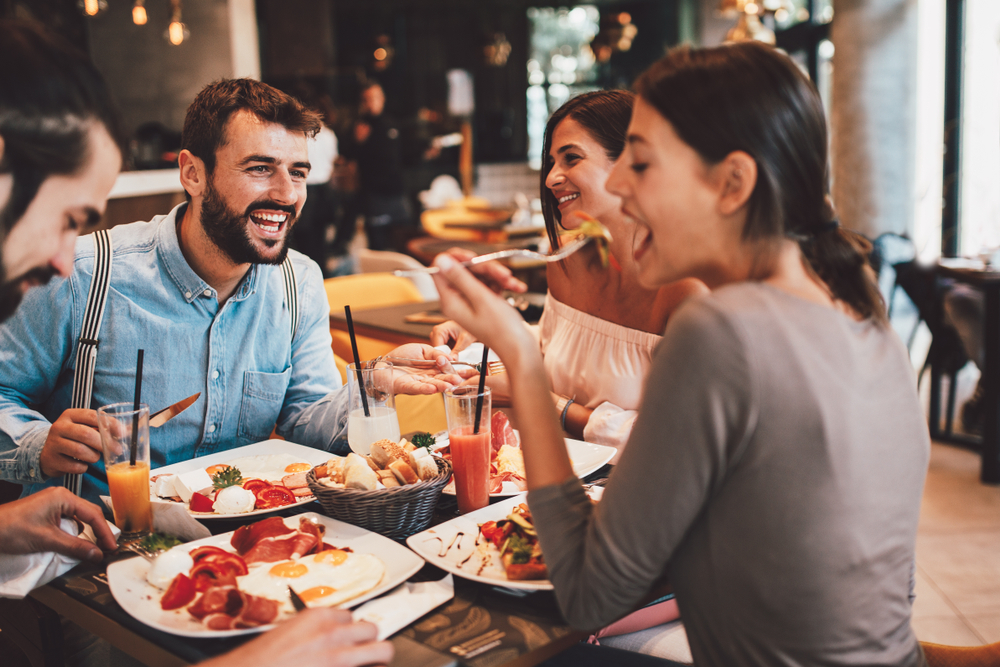
Do not let yourself be distracted and focus on the food
Our home is not getting filled only with gifts, but also plenty of sweets, and the cupboards are full of snacks remaining from the festivities or still “awaiting the guests”… On long winter nights, we love to curl up in front of the TV or a computer and have different treats. However, while we are enjoying a tense movie, we very quickly forget about everything else and finish the whole bag of chips or a box of pralines. If you want to avoid “lecturing yourself” when you realize you have eaten a weekly stock of snacks during yesterday’s movie night, it’s better to consciously enjoy snacks, without any disturbances. Eat slowly and try to enjoy every bite. It also helps if you measure and prepare in advance portions of your favorite “unhealthy snacks”. You can prepare a smaller quantity of chips in a bowl and leave the remaining quantity in the bag and put it back in the cupboard to use some other time. If watching a movie without snacks is totally unacceptable to you, think about healthy alternatives: apple chips, unsalted nuts, cut carrots…
Maintain normal blood sugar levels
If you eat a lot of white bread, sweets and other food with a high glycemic index, your blood sugar level will soar, and then plunge. Such fluctuations increase the feeling of hunger and thereby lead to more frequent overeating. If you want to control the level of sugar in your blood, eat food with a low glycemic index, such as beans, brown rice, and oat flakes.
Eat slowly and enjoy the food
We all know that when a platter of holiday treats arrives on the table, we often rush to “attack”. However, if we eat slowly, we give our body enough time for it to send the information to the brain that we have eaten enough. So, despite a hearty meal, it is worth it to spare a moment to take a deep breath and chew each bite well. This way you will feel full faster, and it will be easier for you to resist unnecessary extra servings. Of course, eating slowly is a skill that needs to be practiced, but don’t give up, be persistent and you will master it in no time.
Be careful with the alcohol
Over-consumption of alcohol has numerous negative effects that do not need to be specifically highlighted. However, for all those who love to overeat, it is important to know that bigger quantities of alcohol increase the feeling of hunger.
Drink water or unsweetened tea between meals
If you drink more water before or during a meal, your stomach will expand, you will feel full quicker, and put down the cutlery sooner. If you are not a big fan of water, try some other low-calorie drinks, such as unsweetened lemonade or tea.
Use smaller plates
We often unconsciously adjust the food portions to the plate size. Also, even a relatively large portion can look small on a huge plate – so be careful. If you are worried that you might eat too much, it is better to serve food on a smaller plate. When you finish the portion from the plate, you can stop and judge whether you are still hungry and eat a bit more if necessary.
Don’t restrict yourself
Promising yourself that you will never touch chocolate, bagels, chips, or fried treats again…For most of us, that’s mission impossible. Besides that, by completely giving up on certain foodstuffs or dishes that we love, we can start feeling deprived, which with time leads to binging on those dishes. So – no matter how strange it sounds – knock yourself out! A piece of cake, a cookie here and there, and an occasional fast-food meal will not harm you if your menu is based on a balanced, non-processed diet with a lot of fiber.
First aid in case of overeating: Donat
However, since everyone gets carried away sooner or later, it is good to know how we can help ourselves if we burden our digestive system with a big quantity of delicacies that are difficult to digest. In this case as well our first line of defense against constipation is Donat. It is a completely natural osmotic laxative that is extremely effective mostly due to sulfate salts. They attract water into the colon which increases the volume of the stools, and this stimulates bowel function. The increased amount of water in the colon softens the stools which significantly facilitates defecation.
How to enjoy Donat and at the same time defeat holiday constipation? To achieve an effortless bowel movement and stimulate your bowels to work, drink 0,2 – 0,3 liters of Donat in the morning on an empty stomach, and 0,2 liters before dinner. Ideally, Donat should be warm (heated to body temperature), but it can also be at room temperature. Everyday consumption of Donat will stimulate your bowels in a completely natural way, and its efficiency and safety have been clinically proven.
Holiday time is not a time of abstinence, but it is good to know that natural help is out there. Donat is the first aid in the fight against slowed digestion, bloating, and constipation. It will bring real relief to anyone who is feeling uncomfortably heavy after a meal. With Donat as a natural solution for stimulation of digestion, do not forget about the importance of a diverse and balanced diet and a healthy lifestyle.”
If we sit at a table stuffed with good food, there is a big chance that we will eat more than usual. During the holidays this can happen not just a few times a week, but even a few times a day. The food we eat during the holidays is usually more calorific than the food we normally eat: it has more fats, salt, sugar… Over-consumption of such food and drinks puts a big stress on the liver and digestive system, which in many people causes bloating, constipation, and malaise. Feeling full is often followed by slowed digestion, which can quickly spoil the mood.
Frequently asked questions
1. Why is overeating during the holidays bad for the body?
If we consume too much food that is difficult to digest for more days in a row, the probability of experiencing digestive problems such as constipation, bloating, the feeling of incomplete bowel movement, etc. increases.
2. How to avoid overeating during the holidays and in general?
It is very important to include in our meals food rich in fiber which will satiate us sooner and drink a lot of water or unsweetened beverages. It is also important to chew slowly, and not to eat the snacks straight from the bag or packaging, but measure the quantity beforehand. It is also useful to use smaller plates and cutlery and eat regular meals, i.e., eat smaller meals but more frequently, and to surround ourselves at parties or gatherings with people who eat less than us.
3. How can we help our digestion if we occasionally overeat?
The best weapon against bloating and constipation is Donat, a natural osmotic laxative that does not cause addiction or side effects and whose efficiency has been clinically proven.
4. How does Donat help us in case of overeating?
Donat’s impact on stimulation of digestion is mostly a consequence of sulfate salts that attract water into the colon. This increases the volume of the stools, which stimulates bowel function.
5. How to drink Donat if we want to stimulate our digestion?
To achieve an effortless bowel movement and stimulate your bowels to work, drink 0,2 – 0,3 liters of Donat in the morning on an empty stomach, and 0,2 liters before dinner. Ideally, Donat should be warm (heated to body temperature), but it can also be at room temperature. Donat can be consumed every day.
Choose chapter:
